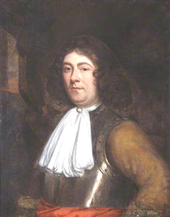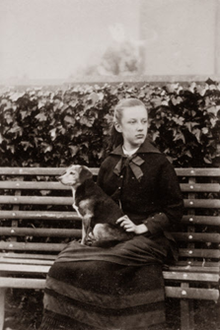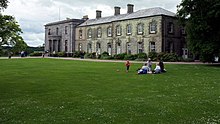Rosalie Chichester
Rosalie Caroline Chichester (born November 29, 1865 in Arlington Court , † January 17, 1949 in Woolacombe ) was a British landowner, writer, photographer and collector. She bequeathed all of her property to the National Trust .
Origin and youth
Rosalie Chichester was of a line of the Chichester family , an ancient family of the Gentry of Devon . She was the only child of Sir Bruce Chichester, 2nd Baronet, and his wife Rosalie Chamberlayne . As a child and adolescent, she was raised on the family estate of Arlington Court and by tutors during her parents' extensive sea voyages. Her father owned a stately yacht, on which she twice toured the Mediterranean with her parents. During the second trip her father fell ill with Malta fever in 1877 and died of the consequences of the disease in 1881. The management of the family property was now initially taken over by Rosalie's mother. In 1885 Rosalie was introduced as a debutante at the royal court. Through her upbringing, she had become a class-conscious woman who was considered very well versed in etiquette and genealogy.
Life as an unmarried large landowner
In 1886 Rosalie came of age and inherited the considerable property of her family, which her father had left her, however, heavily burdened with debts. She remained unmarried, apparently at her mother's request, possibly because the remote location of the Arlington Court family home and her financial situation contributed to her celibacy. After her mother's death in 1908, she lived in Arlington Court from 1912 to 1939 with a Miss Chrissie Peters , a partner she paid. Little by little, she had taken on the duties of a large landowner. She reduced the number of servants and sold the family's estates in Wales, and although agriculture in Britain was in economic crisis from the 1870s to 1914, causing lease income to stagnate or decline, Miss Chichester managed to reduce the debt. She was able to pay off the debt in full by 1928, and upon her death she left a fortune of over £ 131,000.
Miss Chichester was interested in botany and animals. She raised Jacob sheep and Exmoor ponies on her estate . Her mother had already refused to hunt deer, and Miss Chichester, unlike many of her peers, was a staunch opponent of hunting. It successfully prevented hunting parties from hunting on their properties, and before the 1930s they surrounded their properties with a 14 km metal fence. Painting was one of her other hobbies, and she was an enthusiastic photographer who developed her own photographs. She also worked as an author. At the age of eighteen she put together her own monthly magazine on events, scandals, art and politics, all of which she wrote herself. Later she wrote regularly for the illustrated Daily Sketch and for the North Devon Journal , in addition she wrote numerous romantic stories, which she did not publish. After she had more financial leeway again by reducing her debts, she again undertook major trips, including from 1920 to 1921 and 1928 to Australia and New Zealand. From her travels she brought numerous memorabilia to Arlington and reported about her travels in the local press.
Social Commitment

Until her death, Miss Chichester preserved the politically conservative values of the landed gentry from the mid-19th century. But she also saw herself as a landowner committed to her tenants and tried to improve the living conditions of her tenants and farm workers. As early as 1886, the Arlington Parish News had praised their genuine concern for the rural population. Miss Chichester supported local events, was charitable, patronized clubs, and regularly opened her park to events during the summer. Until her death, however, she was an advocate of the monarchy and the privileges of the landed gentry. Her mother had chaired a local Primrose League group that campaigned for the preservation of the monarchy and the Church of England and for the expansion of the British Empire and opposed the Irish Home Rule . Miss Chichester followed her mother's example. From 1885 to 1890 she was also active in the Primrose League. As chairman of a local group for the association, she made several public speeches and frequently invited members to events at Arlington Court. In August 1913, she officially joined the Women's Social and Political Union . Miss Chichester may have sympathized with the movement before, but now she has become an open advocate of introducing women's suffrage. On December 1, 1913, she presided over a meeting in Barnstaple , where she resolutely opposed violent action. In May 1918 she helped found a local branch of the Women's Citizens Association in Barnstaple. However, she served more as a figurehead of the movement and did not take over the chairmanship.
During the First World War , she was a member of a committee that decided whether to call up farm workers for military service. During the war, out of a sense of duty rather than conviction, she supported the Women's Land Army , which tried to replace the missing men in agriculture with women. After World War I, Miss Chichester realized that British society had changed radically as a result of the war. Aware that the gentry was losing her dominant social position, and perhaps also driven by her loneliness and aimlessness, she became a manic collector. Shaped by deep local patriotism, Miss Chichester supported the National Trust for Places of Historic Interest and Natural Beauty, founded in 1894 . After her mother's death in 1908, she donated property on the north coast of Devon to the National Trust in memory of her parents, and in 1911 she donated Morte Point , also on the north coast of Devon, to the National Trust to protect the landscape from commercial development . Since she had no direct heirs, she bequeathed Arlington Court, including the 14 km² property, including eighteen farms, and other properties on the North Devon coast, to the National Trust in 1945 while she was still alive. Through this donation, the property was preserved as a whole, unlike many other goods. Miss Chichester retained her residence in Arlington, but died in her Parade House estate in Woolacombe on the north Devon coast. Her ashes were buried in Arlington Park, where a stone urn commemorates them. After her death, National Trust staff kept her manor house on record. These included 75 cupboards with shells, 200 model ships, several hundred pieces of pewter dishes, hundreds of snuff boxes, 50 ladles, 30 tea caddies, 52,000 postage stamps, stuffed birds, African masks, clocks and paperweights.
Web links
- Devon Historic Society: Chichester, Miss Rosalie Caroline
- National Trust: Miss Rosalie Chichester
- Jan Marsh: Chichester, Rosalie Caroline (1865-1949). In: Henry Colin Gray Matthew, Brian Harrison (Eds.): Oxford Dictionary of National Biography , from the earliest times to the year 2000 (ODNB). Oxford University Press, Oxford 2004, ISBN 0-19-861411-X , ( oxforddnb.com license required ), as of 2004
Individual evidence
- ^ National Trust: Miss Rosalie Chichester. Retrieved May 20, 2019 .
- ↑ Trevor Lummis; Jan Marsh: The woman's domain. Women and the English country house . Viking, London 1990, ISBN 0-670-81680-9 , p. 154
- ^ National Trust (ed.): Arlington Court and the National Trust Carriage Museum . Swindon, National Trust 2009, ISBN 978-1-84359-352-2 , p. 10.
- ^ National Trust (ed.): Arlington Court and the National Trust Carriage Museum . Swindon, National Trust 2009, ISBN 978-1-84359-352-2 , p. 11.
- ^ Devon Historic Society: Chichester, Miss Rosalie Caroline. Retrieved May 20, 2019 .
- ^ National Trust: Miss Rosalie Chichester. Retrieved May 20, 2019 .
- ^ National Trust (ed.): Arlington Court and the National Trust Carriage Museum . Swindon, National Trust 2009, ISBN 978-1-84359-352-2 , p. 11.
| personal data | |
|---|---|
| SURNAME | Chichester, Rosalie |
| ALTERNATIVE NAMES | Chichester, Rosalie Caroline |
| BRIEF DESCRIPTION | British landowner, collector and benefactor |
| DATE OF BIRTH | November 29, 1865 |
| PLACE OF BIRTH | Arlington Court |
| DATE OF DEATH | January 17, 1949 |
| Place of death | Woolacombe |


